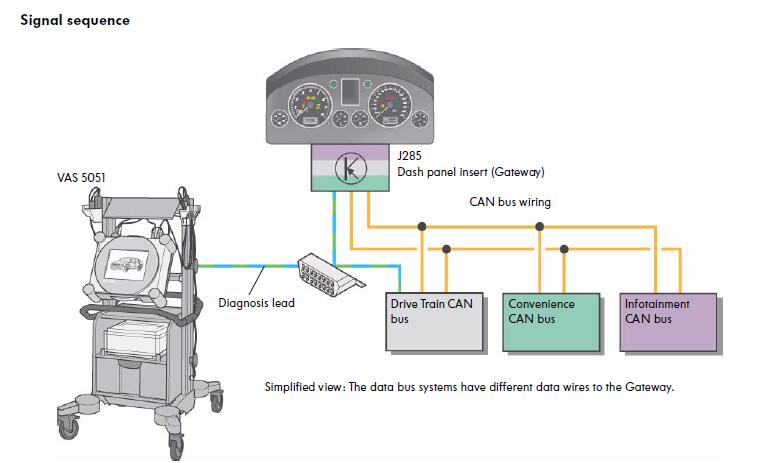Here is a post focus on Volkswagen J519 electrical power supply control unit instruction,if you are want to know J519 module knowledage,it is a point to get.And i have written a article: VW Facelift Vans Wipers Fault by J519 Module Trouble
The onboard power supply control unit J519
Functions of J519 onboard power supply control unit
Until now control units and relays functioned at different locations in the vehicle. In the onboard power supply control unit, these functions are now localised.
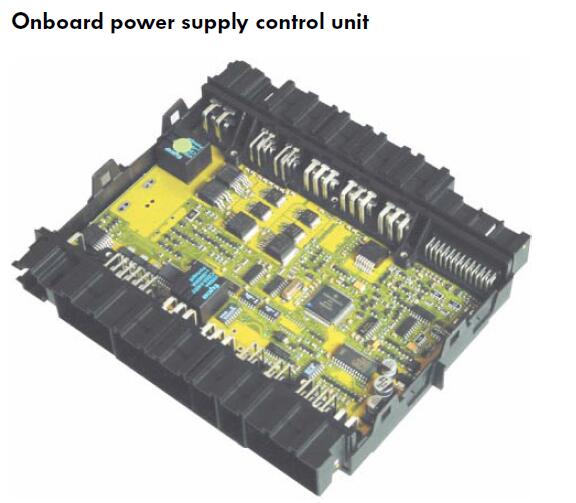
The onboard power supply control unit in the Touareg is responsible for the following functions:
- Load management
- Parking light
- Dipped beam headlights
- Side lights
- Turn signals (not in exterior mirrors)
- Main beam headlights
- Additional main beam headlights
- Fog lights
- Footwell lights
- Terminal 58d
- Indicator lamp for hazard warning lights
- Relay for headlight washer system
- Fuel pump priming action
- Horn
- Twin washer pump
- Interior lights
- Rain and light sensor voltage supply
Furthermore, the following switches and signals are processed and sent via the CAN bus to other control units.
- Bonnet contact switch
- Exterior mirror adjustment switch
- Hazard warning lights button
- Light switch
- Voltage supply at starter and onboard power supply battery
J519 Fitting location
The onboard power supply control unit can be found in the vehicle interior on the driver’s side under the dash panel in the footwell.
It is connected to the E-box in the same way as the entry and start authorisation control unit.
Fitting location of onboard power supply control unit and entry and start authorisation control unit
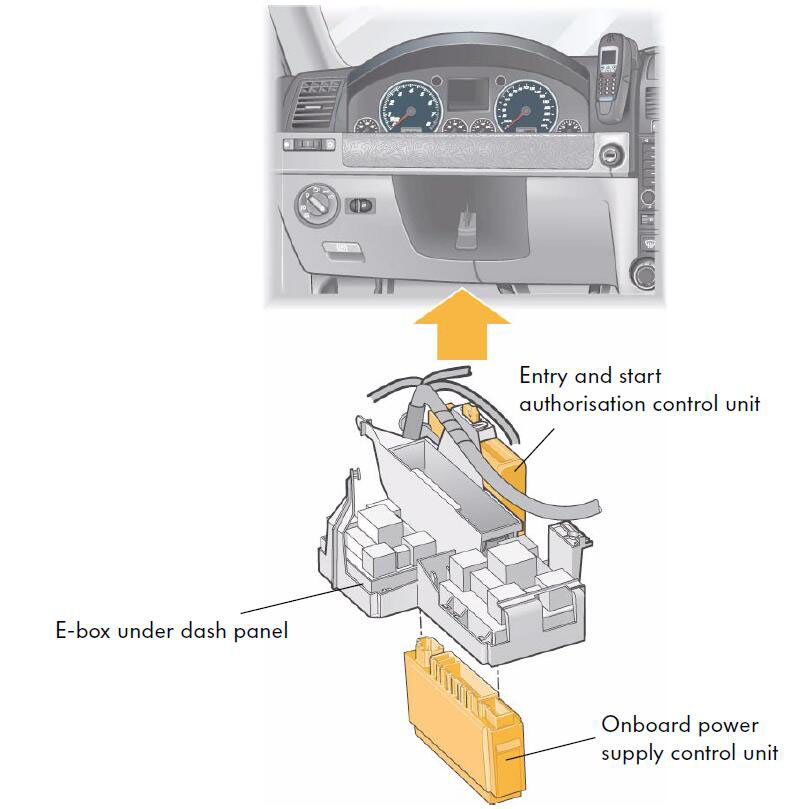
Load management
Furthermore, the onboard power supply control unit deactivates convenience system consumers and long-term HT consumers e.g. heated rear windscreen, so that heavy discharging of the battery is avoided. If the onboard power supply is placed too much under load, the idling speed is also increased.
This ensures that there is always sufficient energy to start the engine. Switching off is inline with the guidelines for the Volkswagen Phaeton and is described in Self-Study Programme 272.
Priming function of electrical fuel pump
The petrol engines of the Volkswagen Touareg all feature a priming function of the fuel pump so that enough pressure in the fuel lines can be built up.
Function:
When the driver’s door is opened and terminal 15 is closed, a signal is sent via the CAN bus from the entry and start authorisation control unit J518 (terminal 15 off), a signal is also sent from the driver’s door control unit J386 (driver’s door opened) and, for reasons of safety, a discreet signal (status of terminal 15) is sent to the onboard power supply control unit J519. This then actuates the relay to prime the fuel pump for approx. 2 seconds. The priming function of the fuel pump is stopped when the ignition is switched on. Continued actuation is done through the engine control unit.
If the driver’s door stays open, the actuation is repeated a maximum of three times in intervals.
Timed actuation from the onboard power supply control unit prevents continued actuation of the fuel pump if the driver’s door is opened and closed a number of times in short intervals.
Crash shut-off
If with the ignition switched on a crash is detected, a signal is sent from the airbag control unit J234 via the CAN bus and the fuel pump is switched off immediately. After about 5 seconds
it can be activated again by switching the ignition off and on.
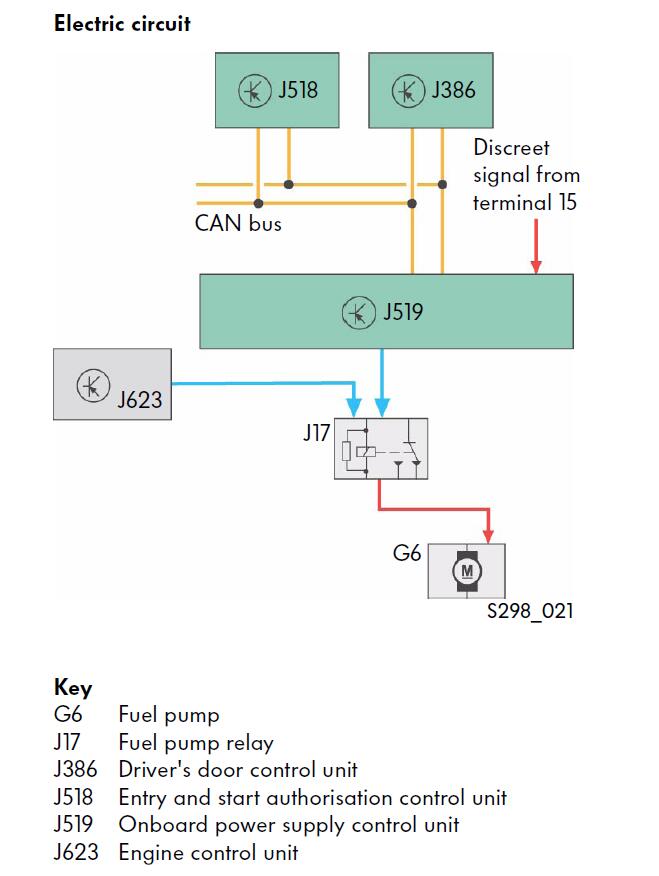
Interior light actuation
The interior lighting is actuated by the onboard power supply control unit. The voltage supply comes from terminal 30G.
To prevent discharge of the vehicle battery when the interior lights are switched on, power supply from terminal 30G is interrupted in the following circumstances:
– the ignition is switched off,
– the vehicle is locked from the outside and all doors are locked.
Terminal 30G is activated under the following circumstances:
– the interior light switch is actuated,
– the ignition is switched on,
– the vehicle is unlocked, a door, the bonnet or the tailgate is opened,
– the bonnet contact switch.
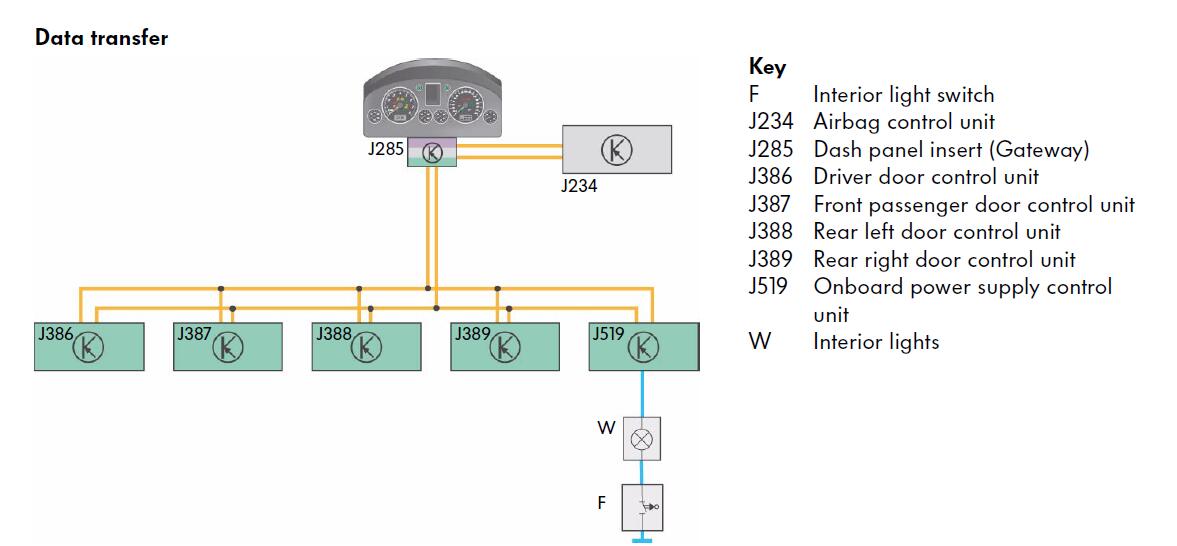
Note: If a crash is detected, the interior light is switched on immediately. After the ignition is switched on and off and after is has been switched on again, the cut-off function from terminal 30G is reactivated.
The headlights
Main headlights Headlights without additional main beam
The basic equipment comprises a DE headlight with H7 halogen bulb and a H9 halogen bulb for main beam.
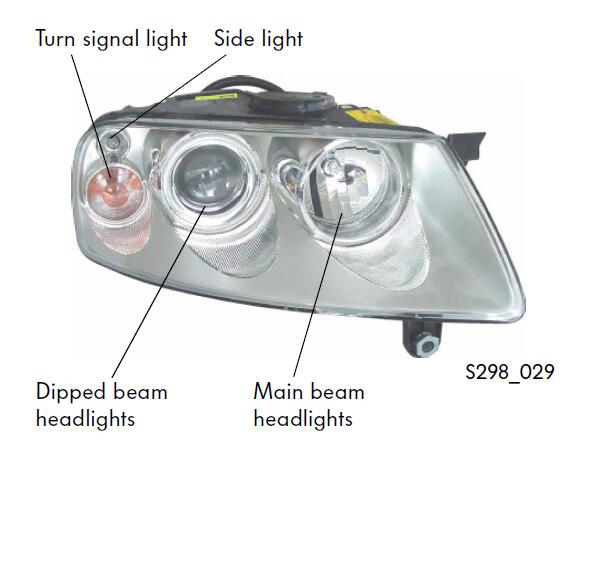
The “M” equipment level features bi-xenon headlights for main and dipped beam and additional DE headlights with H7 bulbs for main beam. On this version, only the headlights for additional main beam flash when the flasher unit is actuated and the dipped beam is not switched on. A brief actuation of the xenon lamps,e.g. when flashing lights as a signal, shortens their useful life. The turn signals are cool blue in appearance but flash yellow when they are switched on.
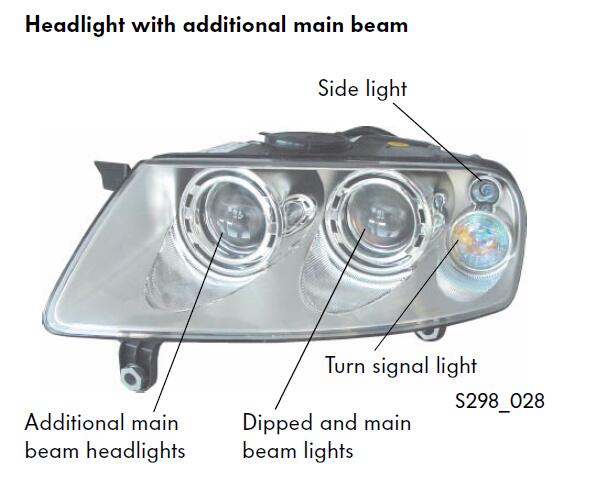
The rear light
For the rear lighting of the vehicle, rear light clusters with bulbs are used. The rear light clusters are split into two parts.
One part is fixed to the sidewall and the second part can be found on the tailgate.
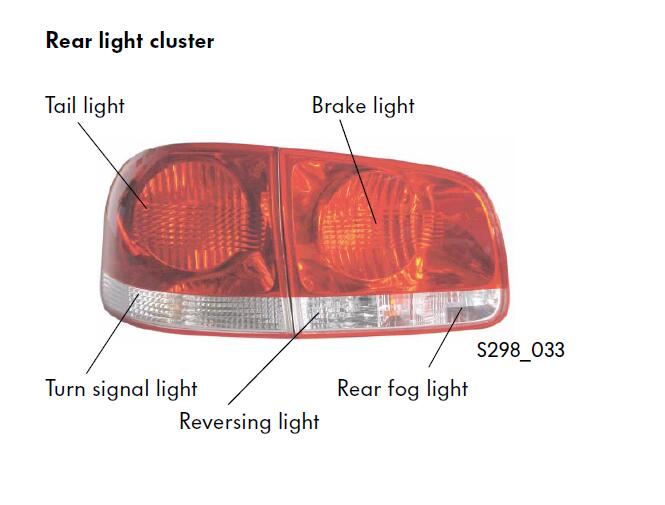
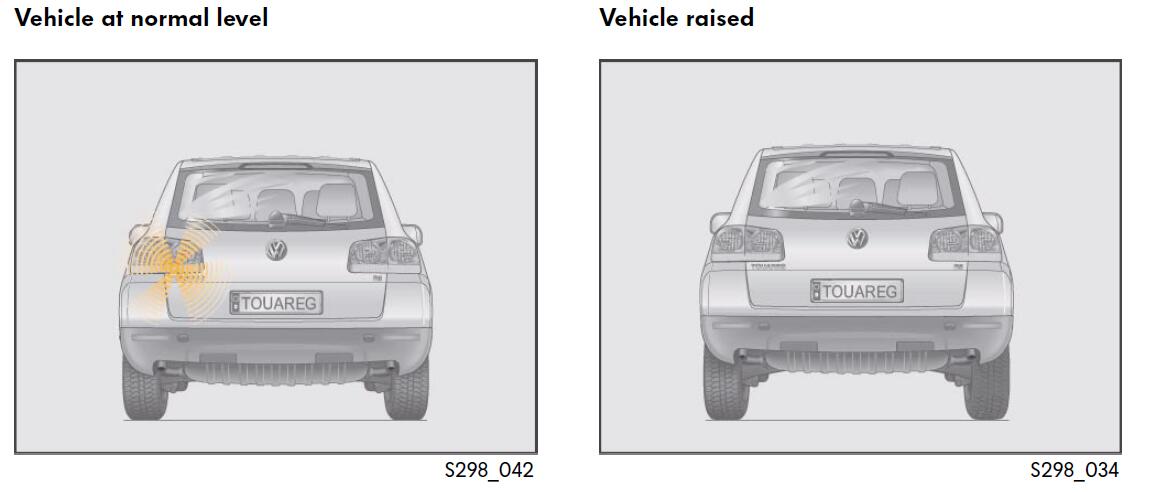
Rear fog light
Due to the Touareg’s off-road capability, the adaptive suspension of the vehicle allows greater changes in vehicle height than on normal automobiles. Government regulations require, in Japan for example, that the rear fog light is switched off when the vehicle is in the highest position.
This function is available for other countries as a code in the onboard power supply control unit.
Surround lighting
The lights integrated in the exterior mirrors illuminate the area around the vehicle.
Conditions for activation:
The lights are actuated simultaneously with:
– the interior lights,
– the coming home/leaving home lighting function.
The surround lights are controlled by the onboard power supply control unit via the CAN bus and actuated by the driver’s and front passenger’s door control units.
To prevent the surround lights from becoming damaged by long periods of activation, a protection feature is integrated in the onboard power supply control unit which switches off the
lights after a prescribed duration to allow them to cool down.
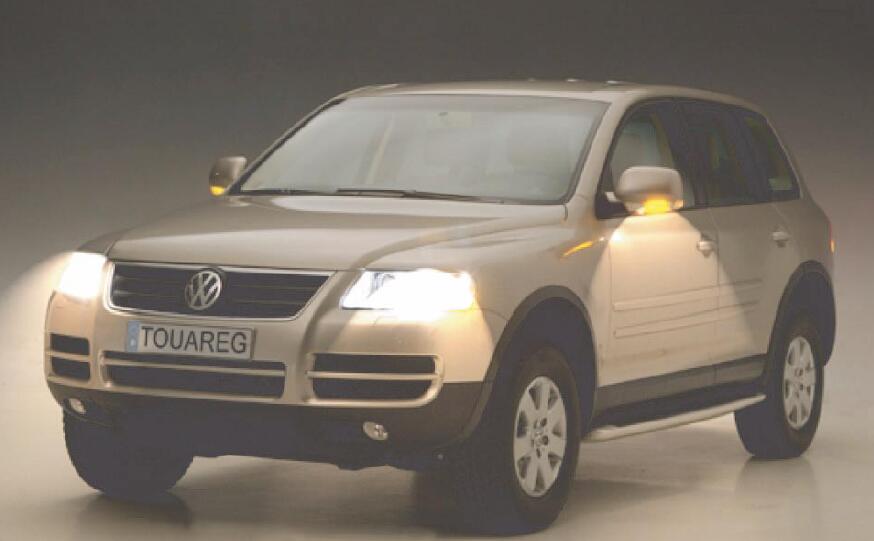
The convenience lighting
Lighting settings
In the set-up menu of the dash panel insert,various adjustments can be made to the lighting:
– Duration of coming-home lighting,
– Day driving light,
– Brightness of footwell lighting.
The duration of the coming-home lighting can be set between 0-90 seconds. After 90 seconds, the lights are switched off automatically to avoid discharging of the battery.
In the set-up menu, the day driving light function can be switched on or off. This option is only available in countries where day driving lights are not a legal requirement.
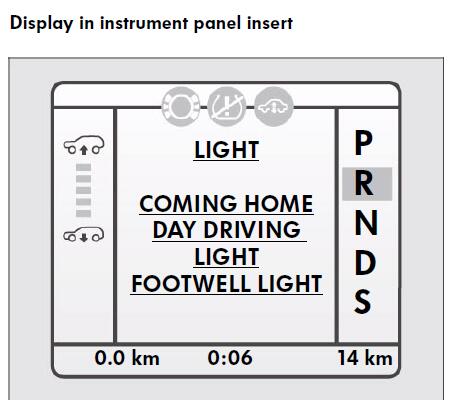
The footwell lighting can be adjusted from 0 %-100 %.
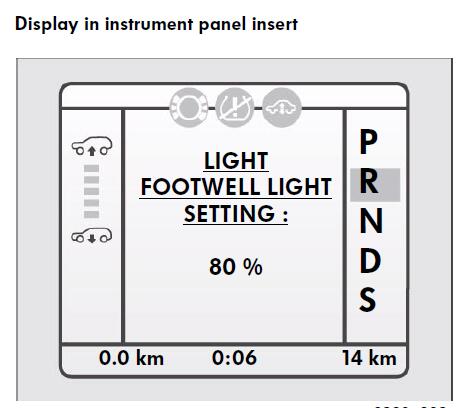
Networked functions
The lighting
Turn signals
The main function of the turn signals is set in the onboard power supply control unit.
Signal sequence:
– Turn signal switch
– Steering column electronics control unit
– Onboard power supply control unit (actuation of turn signals)
– Trailer detection control unit (actuation of turn signals on trailer)
– Driver and front passenger door control units (actuation of turn signals in exterior mirrors)
– Dash panel insert (actuation of warning lights and display of warning messages)
Side lights
The main function of the side lights is also set in the onboard power supply control unit.
Signal sequence:
– Light switch
– Onboard power supply control unit (actuation of front lights)
– Convenience system central control unit (actuation of rear lights)
– Trailer detection control unit (actuation of turn signals on trailer)
– Dash panel insert (actuation of warning lights and display of warning messages)
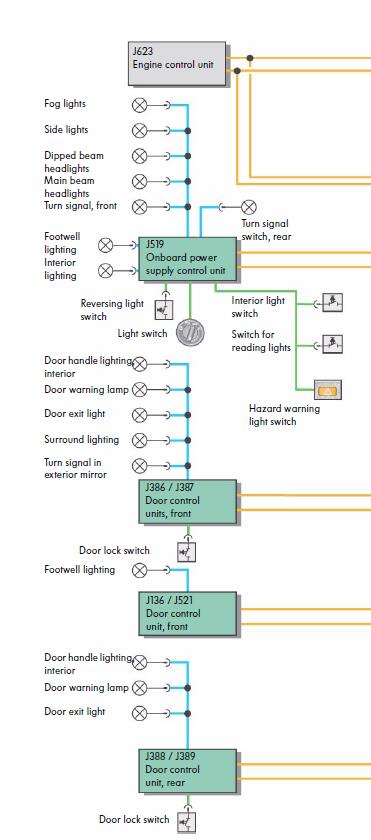
Service
The lighting
Removing headlights Headlights with safety locks
The headlights are designed based on the principle of sliding drawers. They can be pulled out. To do this, a socket must be used on a hexagon drive to unscrew the headlights.
This releases the lock and the headlight can be removed.
The direction of rotation differs on the left and right.
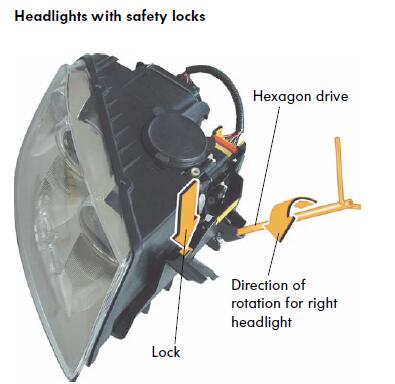
Rear lights
On the fixed part of the rear light cluster, the lamp must be removed to replace the bulb.
The bulbs of the rear light in the tailgate can be replaced by changing the lamp holder
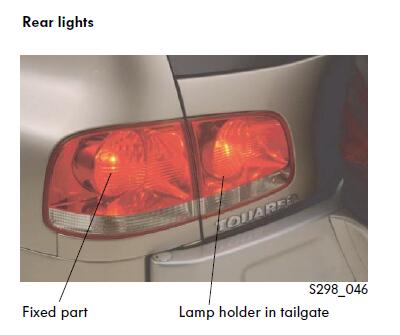
Diagnosis
Guided fault finding
The data from the guided fault finding function is interrogated by the vehicle diagnosis, testing and information system VAS 5051.
To do this, the guided fault finding function must be selected. All the necessary information can be found there.
The data is interrogated via a diagnosis interface for the data bus in the dash panel insert.
A wired communication connection is only necessary to some control units in the drive train
CAN bus, to control units for gas discharge lamps and to the convenience system central control unit.
